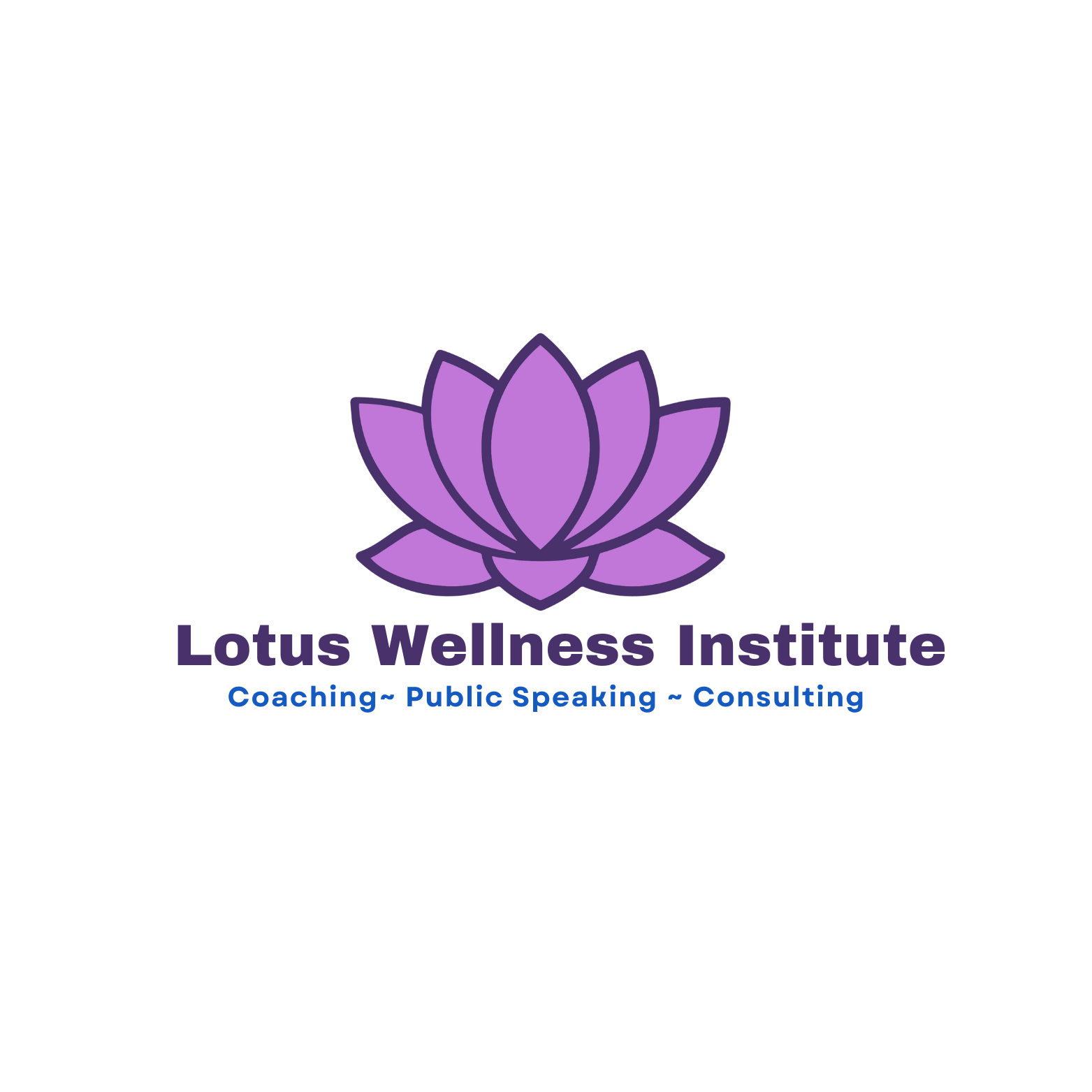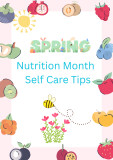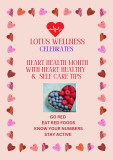
Embracing Self-Care: The Art of Letting Go
This topic came to me as I am clearing out my two college student storage units. Every May to August, I rent a storage unit for my two college students to store their dorm and apartment items while they are out of school during the summer months. This four-month routine lasted for 7 months this year due to a lack of motivation and time.
As I am going through storage unit items, I am like Why do I still have this or that. So, this blog is for those who are still holding on to artifacts, clutter items, and old things just because they don't have the time or interest in clearing them out.
In our fast-paced day-to-day routine, we often overlook certain aspects of self-care like the powerful act of letting go—freeing ourselves from outdated situations, habits, and things that no longer serve our higher good. Embracing this release not only declutters our physical and mental space but also rejuvenates our spirit.
Defining Letting Go
Letting go is the conscious decision to release what holds us back. It's about identifying and parting with negative energy, relationships, commitments, and even physical clutter that drain our resources and hinder our growth.
Why is Letting Go Important for Self-Care?
Letting go is crucial for self-care because:
- Emotional Freedom: By releasing toxic relationships and negative emotions, you make room for positivity and love.
- Mental Clarity: A clutter-free environment and mind can enhance focus and productivity.
- Increased Energy: Eliminating what drains you allows for increased energy and creativity.
- Enhanced Well-Being: By prioritizing what’s truly important, you cultivate a more peaceful and fulfilled life.
Benefits of Letting Go-
1. Improved Relationships:
- Say goodbye to toxic connections that drain you emotionally.
- Open the door for healthier, more meaningful relationships.
2. Reduced Stress and Anxiety:
- Declutter your home and workspace to reduce overwhelm.
- Develop a stress-reduction routine that suits your lifestyle.
3. Personal Growth:
- Create space for new opportunities.
- Embrace change with openness and curiosity.
4. Enhanced Focus and Productivity:
- Organize your environment for greater efficiency.
- Prioritize tasks and goals that align with your passions and values.
5. Greater Self-Acceptance and Love:
- Let go of self-criticism and negative self-talk.
- Practice gratitude and recognize personal achievements.
Steps to Letting Go-
- Identify: Reflect on what’s holding you back or no longer serves a purpose.
- Declutter: Physically and emotionally, start with small steps, like clearing out a drawer or setting boundaries with others.
- Forgive: Release resentment and grudges, understanding that forgiveness is for your peace of mind.
- Focus: Always center on your goals and what truly matters to you.
As I am eliminating old things and situations, I am reminded of the importance of living in the now!
What are you still holding onto?
What do you need to release or let go of?
How can you free up space, time, and energy?
Takeaway:
Letting go is a transformative power essential to our well-being. It involves more than just discarding the physical; it's about emotional and mental liberation. By choosing to let go of what no longer serves you, you embrace a path to self-care where peace, fulfillment, and personal growth are the norm. Begin this journey today, and unlock the limitless possibilities waiting for you.
Remember, self-care is a lifelong journey, and the art of letting go is a significant step towards a more peaceful, empowered existence.
Embrace it, and watch how it positively transforms your life.
In Wellness
Jennifer
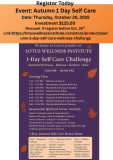
Title: Embrace the Autumn Glow: Join Coach Jennifer's 1 Day Autumn Self-Care and Wellness Challenge on October 30th
Autumn is here, and with it comes a golden opportunity to reset, recharge, and realign your mind, body, and spirit. As the leaves change and the air turns crisp, it's the perfect time to focus on self-care practices that nourish your inner world. I'm excited to share Coach Jennifer's 1 Day Autumn Self-Care and Wellness Challenge, happening live on October 30th from 7 pm to 10 pm. Whether you're a busy professional, a parent, or someone seeking deeper personal growth, this challenge will guide you through transformative practices tailored for the fall season. Let's dive into why autumn self-care is essential, what we'll cover, and how you can join in to plant seeds for a vibrant end-of-year journey.
Why Focus on Autumn Self-Care Practices?
Autumn isn't just about pumpkin spice lattes and cozy sweaters—it's a season of transition that mirrors our own lives. As nature sheds its leaves, we too are invited to let go of what no longer serves us, making space for renewal. Engaging in autumn self-care practices helps us adapt to the shorter days and cooler weather, which can affect our energy levels, mood, and immune system. This is the time to build resilience, support your body's natural rhythms, and prevent burnout before the holiday rush hits.
Focusing on self-care now sets the tone for the rest of the year. It's when we plant seeds of intention, make meaningful changes, and cultivate habits that carry us into winter and beyond. By prioritizing your well-being in autumn, you're not just surviving—you're thriving, creating a foundation for lasting health and happiness.
Supporting Your Body: Key Organs, Supplements, Vitamins, Minerals, and Herbs for Fall
In autumn, our bodies need extra support for organs like the lungs, kidneys, and immune system, which are more vulnerable to seasonal changes like dry air and fluctuating temperatures. Traditional wellness wisdom emphasizes strengthening these areas to ward off colds, fatigue, and emotional heaviness.
Here are some essential supplements, vitamins, minerals, and herbs to incorporate this season:
Vitamins and Minerals: Boost your intake of vitamin C (for immune support), vitamin D (to combat shorter days), and magnesium (to ease stress and promote restful sleep).
Supplements and Herbs: Turn to adaptogens like ashwagandha for stress relief, elderberry for immune defense, and turmeric for its anti-inflammatory properties. Herbs such as ginger and cinnamon can warm the body and improve circulation, while nettle leaf supports kidney function and provides a mineral boost.
These elements aren't just about physical health—they align with autumn's energy, helping you feel grounded and balanced. In the challenge, Coach Jennifer will share simple ways to integrate these into your routine, ensuring you feel empowered and informed.
### The Benefits of Autumn Self-Care and Our Mission and Goals
The benefits of these practices are profound. You'll experience improved energy, clearer skin, better sleep, and a stronger immune system, all while reducing stress and fostering emotional clarity. But it's more than physical—autumn self-care nurtures your mental and spiritual well-being, helping you release old patterns and welcome abundance.
Our mission with this challenge is to empower you to live a life of intentional wellness. Coach Jennifer's goals are simple yet transformative: to guide you in building sustainable habits that honor your body's needs, foster self-compassion, and create a ripple effect of positive change. By the end, you'll feel more connected to yourself and ready to tackle the year's end with confidence.
This time of year is especially special because it acts as a bridge between the busyness of summer and the introspection of winter. It's your chance to plant seeds for personal growth, make the changes you've been pondering, and set intentions that shape your future. Think of it as a seasonal reset that aligns you with nature's wisdom.
Nourishing Your Body and Soul: Teas, Tonics, Soups, and More
Fuel your autumn journey with warming, nutrient-dense foods and practices. Start with teas and tonics like a soothing ginger-turmeric blend to boost immunity and circulation, or a nettle and mint infusion to support detoxification. For tonics, try a simple apple cider vinegar mix with honey and cinnamon to aid digestion and balance blood sugar.
Don't forget hearty soups—think a root vegetable medley with carrots, beets, and squash, packed with vitamins A and C for glowing skin and strong immunity. These recipes aren't just delicious; they're designed to ground you and provide the comfort we crave in fall.
We'll also explore how to set your intention through guided meditations and journaling. Learn to practice forgiveness by reflecting on past hurts and releasing them with a simple release statement or prayer, like: "I release what no longer serves me, making space for new beginnings." Follow this with empowering "I am" statements, such as: "I am worthy of peace and abundance," to rewire your mindset.
Physical practices are key, too. Incorporate dry brushing to stimulate circulation and detoxify your skin, face rolling for lymphatic drainage and a natural glow, rebounding (like mini-trampoline exercises) to boost lymph flow and energy, walking in nature to clear your mind, and prioritizing hydration with warm herbal teas. Aim for at least 6-8 hours of restful sleep to recharge your body and spirit.
Dealing with Unfinished Business and Setting Goals for the Year Ahead
Autumn is the ideal time to tie up loose ends and let go. We'll address dealing with unfinished business—whether it's unresolved emotions, lingering projects, or relationships that no longer align with your path. Through targeted exercises, you'll learn to forgive yourself and others, letting go of people and things you've outgrown. This release creates space for fresh opportunities and helps you step into the holidays with a lighter heart.
Finally, we'll focus on making goals for the end of the year. What do you want to achieve by December? Set SMART goals (Specific, Measurable, Achievable, Relevant, Time-bound) and back them with action steps, all while tying them to your autumn intentions.
Join the 1 Day Autumn Self-Care and Wellness Challenge
Ready to transform your autumn into a season of growth and renewal? Coach Jennifer's 1 Day Challenge on October 30th, 7 pm–10 pm, is your gateway to all this and more. In this interactive session, you'll receive personalized guidance, practical tools, and a supportive community to help you implement these practices right away.
Spaces are limited, so don't miss out—
sign up today at https://lotuswellnessinstitute.com/events/3659/embrace-the-autumn-bliss-join-coach-jennifer-s-1-day-self-care-wellness-challenge-
Time to take the first step toward a balanced, vibrant fall. Remember, the changes you make now will set the tone for the rest of your year. Let's plant those seeds together!
With warmth and wellness,
Coach Jennifer
---
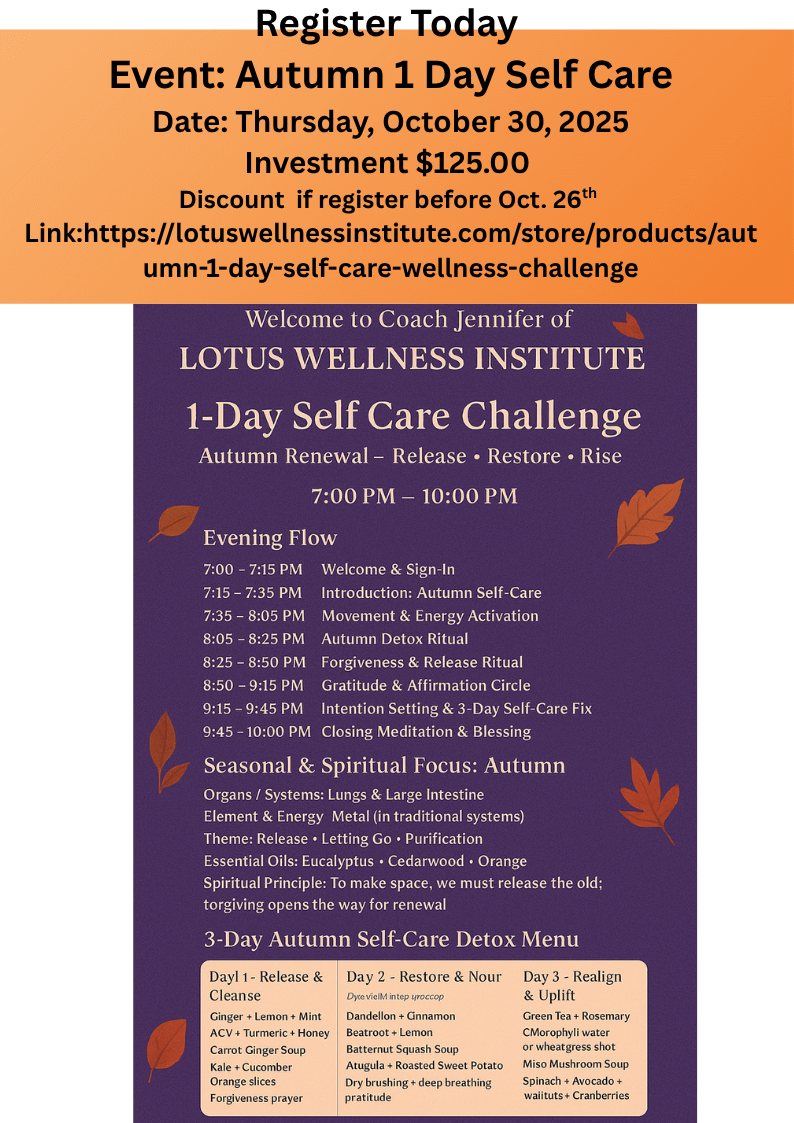
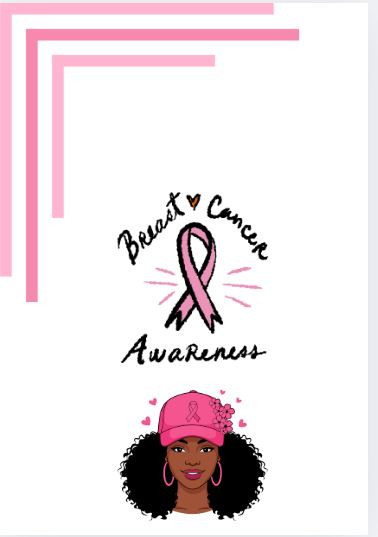
Self-Care and Breast Cancer Awareness: Empowering Your Health Journey-
October marks Breast Cancer Awareness Month—a time when organizations, healthcare institutions, and individuals come together to emphasize the importance of awareness, early detection, and self-care. Whether you're actively engaged in a health journey or supporting a loved one through theirs, understanding breast cancer risk factors and prevention strategies is crucial.
Understanding Breast Cancer-
Breast cancer occurs when cells in the breast grow uncontrollably. While it predominantly affects women, men can also be diagnosed with the disease. Thanks to advancements in medical research and awareness efforts, survival rates have significantly improved, especially with early detection.
Risk Factors-
Awareness begins with understanding the risk factors associated with breast cancer. Some of these include:
1. Genetic Factors: Mutations in genes like BRCA1 and BRCA2 can increase the risk.
2. Family History Having close relatives who have been diagnosed with breast cancer can be a significant risk factor.
3. Age The risk increases as you age, with most cases diagnosed in women over 50.
4. Lifestyle Factors: Sedentary lifestyles, poor diet, excessive alcohol consumption, and smoking can also increase risk.
5. Reproductive History: Early menstruation or late menopause, having children later in life or not at all, and not breastfeeding can play a role.
6. Hormonal Factors: Use of oral contraceptives or hormone replacement therapy has been associated with a slightly increased risk. Balancing hormones naturally can be an effective approach for many individuals, and there are several holistic options you might consider. Here are a few:
Maca Root: Known for its potential to balance hormones and boost energy levels, maca root is often used to support overall endocrine health.
Ashwagandha: An adaptogenic herb, ashwagandha can help manage stress levels and support thyroid function, which in turn may assist in hormonal balance.
Evening Primrose Oil: Rich in gamma-linolenic acid (GLA), this oil is often used to alleviate symptoms related to PMS and menopause.
Omega-3 Fatty Acids: Found in fish oil or flaxseed oil, omega-3s can support hormone production and reduce inflammation.
Magnesium: This essential mineral has a role in over 300 biochemical reactions in the body, including hormone regulation. It's often recommended for alleviating PMS symptoms.
Probiotics: Maintaining a healthy gut microbiome can influence hormone balance, so incorporating probiotics can be beneficial.
DIM (Diindolylmethane): Found in cruciferous vegetables, DIM can support estrogen metabolism, which may aid in balancing estrogen levels.
Rhodiola Rosea: Another adaptogen that can help manage stress hormones and support overall hormonal balance.
Before starting any new supplement, it's a good idea to consult with a healthcare provider, especially if you have existing health conditions or are taking other medications.
Prevention Tips:
While some risk factors like genetics can't be changed, many lifestyle choices can help reduce your risk. Here are some actionable prevention tips:
1. Regular Screenings: Schedule routine mammograms and check-ups. Early detection dramatically increases treatment success rates.
2. Self-Examinations: Conduct monthly breast self-exams to become familiar with how your breasts feel and spot any unusual changes.
3. Healthy Diet Maintain a balanced diet rich in fruits, vegetables, and whole grains, while limiting processed foods and red meats.
4. Exercise Aim for at least 150 minutes of moderate aerobic activity or 75 minutes of vigorous activity each week.
5. Limit Alcohol and Avoid Smoking: Both are linked to increased risk, so moderating your drinking and quitting smoking can be beneficial.
6. Maintain a Healthy Weight: Obesity, particularly after menopause, is linked to a higher risk of breast cancer.
7. Minimize Stress: Incorporate stress-reducing practices like yoga, meditation, or hobbies that promote relaxation.
Self-Care and Awareness-
Self-care goes beyond physical health; it encompasses emotional and psychological well-being. Here are ways you can practice self-care during Breast Cancer Awareness Month and beyond:
Educate Yourself: Stay informed about breast cancer and empower yourself with knowledge. This can help you make informed decisions about your health.
Seek Support: Connect with support groups or therapy to share experiences and gain emotional support.
Make Time for You: Dedicate time each day to activities that bring joy and help you unwind.
Be Mindful: Practice mindfulness or journal to process emotions and reduce anxiety.
In conclusion, breast cancer awareness and self-care go hand-in-hand. Understanding your risk factors, adhering to prevention strategies, and practicing self-care can empower you in your health journey. Remember, awareness is not just about detection; it's about proactive steps to reduce risks and enhance your quality of life. This October, take a step towards a healthier future by prioritizing your self-care and becoming an advocate for breast cancer awareness within your community.
Get Involved, learn more about breast cancer and how you can make a difference, consider participating in local awareness events, fundraisers, or volunteer efforts. Your involvement can provide critical support to those affected and contribute to ongoing research efforts aiming to eradicate this disease.
By staying informed and proactive about your health, you can lead the fight against breast cancer and inspire others to do the same.
In Wellness, Light & Love
Coach Jennifer

A Heartfelt Reflection on Grief, Self-Care, and Filling Your Cup: In Loving Memory of My Beloved Sister, First Lady Joyce Richardson Upshaw
Dear friends, family, and community,
My heart is heavy as I share this with you. As Coach Jennifer, I’ve always been passionate about guiding others through life’s challenges with wellness, self-care, and emotional resilience. But today, I’m writing from a deeply personal place. Just recently, I lost my beautiful and beloved sister, Joyce Richardson Upshaw, after her courageous 12-year battle with colon cancer. As the one of the oldest of our eight siblings, Joyce was not just my sister—she was our rock, our queen, and an inspiration to us all.
Rest in peace, dear First Lady Joyce; your light will forever shine in our hearts.
Joyce lived a life that embodied grace, faith, and unyielding strength. She was a retired teacher who dedicated her career to nurturing young minds, hosting unforgettable family gatherings that brought us all together. Thanksgiving dinners at her home were legendary—filled with laughter, delicious food, and that special warmth only she could create. She also organized yearly family luaus (a nod to her love for celebration and culture), girl day out events where we’d pamper ourselves with pampering parties and spa days, having our favorite foods, watching her favorite movies, jewelry dashes to Sam Moon lol, spending time around the pool, and simply enjoying life’s joys.
Her birthday month parties were extravagant affairs, complete with beautiful decorations and, of course, her signature glamorous touch. Joyce was fabulous in every way—always dressed in stunning clothes that made her feel like the queen she was, often crowned with beautiful, elegant crowns that symbolized her regal spirit. She was more than glamorous; she was a beacon of poise and confidence, teaching us that self-care isn’t about vanity—it’s about honoring the divine within us.
One of Joyce’s favorite quotes was, “My cup is full,” and oh, how she lived by those words. For her, it meant embracing abundance in every moment, even amidst hardship. She had an incredible family that was the center of her world: her amazing husband, Reverend Dexter, who stood by her side through it all; her three incredible children—Pastor Dexter Jr., Deandre, and Danielle—who carry on her legacy of faith and love; and her six precious grandchildren, who brought her endless joy.
As her sisters and brother, we mourn her loss deeply; she was one of our eldest sibling, the one who guided us with wisdom and unconditional love. Losing her has left a void in our family, but it has also reminded us of the values she instilled: a legacy of unwavering faith, strong family bonds, and the importance of self-care to keep our cups overflowing.
In the midst of this grief, I’ve been reflecting on how we can honor Joyce’s memory by taking care of ourselves. Grief is a profound journey, and it’s okay to feel its weight. In fact, releasing your emotions—through tears, journaling, or quiet reflection—is good for the soul. I’ve learned that crying isn’t a sign of weakness; it’s a release that allows healing to begin. As we navigate loss, let’s remember that self-care is essential for maintaining a “full cup.” Here are some practical tips I’ve gathered from my own wellness journey, inspired by Joyce’s life:
1. Prioritize Emotional Release: Allow yourself to grieve openly. Set aside time each day to cry, talk to a trusted friend, or write in a journal. As Psalm 34:18 reminds us, “The Lord is close to the brokenhearted and saves those who are crushed in spirit.” This act of vulnerability is a form of self-care that lightens your emotional load and prevents burnout.
2. Nurture Your Body and Mind: My beloved Sister Joyce always emphasized the importance of pampering yourself, just like her girl day out events. Incorporate simple routines like taking a warm bath, going for a walk in nature, or enjoying a favorite meal. Physical self-care boosts your energy and helps combat the fog of grief. Remember her favorite scripture, a variation of Philippians 4:13: “I can do all things through Christ who strengthens me.” Lean on this truth to find the strength to keep going, one step at a time.
3. Connect with Loved Ones: Joyce’s gatherings taught us the power of community. Reach out to family and friends, even if it’s just for a virtual chat. Hosting small, meaningful events—like a family dinners, and luau in her honor—can foster connection and shared healing. Surround yourself with those who uplift you, as they did for Joyce with her children, husband, and grandchildren.
4. Incorporate Spiritual Practices: First Lady Joyce a woman of true faith- loved one line sayings from our grandparents, and parents, and the psalms and proverbs for added guidance and wisdom. So, draw from the Psalms for comfort during grief. Psalm 23:4 says, “Even though I walk through the darkest valley, I will fear no evil, for you are with me; your rod and your staff, they comfort me.” Spend time in prayer, meditation, or reading scriptures that resonate with you. This spiritual self-care fills your cup with hope and reminds us of Joyce’s legacy of faith.
5. Celebrate Small Wins and Legacy: Grief can feel overwhelming, but focus on the positives Joyce left behind. She was a queen who wore her crowns with pride, symbolizing her fabulous strength and resilience. Honor her by celebrating your own victories, no matter how small. This could mean hosting a family event or simply affirming your worth daily. By doing so, we keep her spirit alive and build a legacy of faith, family, and self-love for future generations.
Joyce’s life was a testament to what it means to live with a full cup—despite the 12-year battle with colon cancer, she remained glamorous, strong, and devoted. Her children, Pastor Dexter Jr., Deandre, and Danielle, along with her baby love or her life her beloved husband. Reverend Dexter Upshaw, and her six grandchildren, are a living reminder of her enduring impact. As her sisters and brother, we hold onto the memories of her laughter, her wisdom, and her unshakeable faith. She taught us that true wellness comes from within, fueled by love, self-care, and the knowledge that we can face anything with strength.
In summary, as we grieve First Lady Joyce Richardson Upshaw, let’s commit to filling our own cups through self-care, emotional release, and community. Her favorite quote, “My cup is full,” challenges us to find abundance even in loss. Rest in eternal peace, my dear sister—you were, and always will be, our queen. If you’re navigating grief, know that you’re not alone; reach out, share your story, and take that first step toward healing.
Stay Tune for the "First Lady Joyce My Cup is Full Project"
With love and light, and reverence.
See You in the Morning my Beautiful Beloved Sister!
Wellness Coach Jennifer
#GriefAndHealing #SelfCareJourney #InMemoryOfFirstLadyJoyce #LegacyOfFaith #WellnessWarrior
---
Celebrating Father’s Day with Self-Care: A Guide for Every Man
Our mission at Lotus Wellness is to empower men to take charge of their health and well-being. We are committed to providing resources, support, and a community that fosters holistic health, grounded in values of self-empowerment.
Our approach can benefit all men; however, we are particularly Afrocentric, recognizing the unique challenges faced by Black men and providing culturally relevant solutions.
Happy Father (Baba Day)!
Father’s Day is a momentous occasion to honor the unwavering dedication and love of fathers, grandfathers, uncles, sons, nephews, cousins, and friends. Yet, beyond the celebrations and warm gestures, lies an incredible opportunity to reflect on the importance of self-care for men.
Men’s holistic health and self-care play pivotal roles in enhancing not just longevity but also the quality of life, embracing personal fitness, mental well-being, emotional health, and spiritual upliftment. In 2025, men's health continues to be a critical focus in the United States, with significant statistics underscoring the urgency of this issue.
Prostate issues remain a major concern; over 200,000 new cases of prostate cancer are diagnosed annually, and benign prostatic hyperplasia affects nearly half of men over 50.
Heart health, another pivotal aspect, shows that cardiovascular diseases are the leading cause of death for men, with approximately 1 in 4 deaths attributed to heart disease. Moreover, cognitive health is becoming increasingly relevant as studies indicate that 1 in 6 men over the age of 65 suffer from Alzheimer's or another form of dementia. As we move into 2025, the conversation needs to be holistic, integrating physical, mental, spiritual, and emotional well-being.
This Father's Day, Men & Self Care blog looks to explore various self-care regimens, lifestyle choices, and natural supplements that support men’s health, targeting important areas like cardiovascular health, hormonal balance, prostate health, and sexual performance. We also want to remind our Grandfathers, Fathers, husbands, brothers, nephews, cousins, friends, and partners that self-care is not just for women.
Addressing these health concerns necessitates a comprehensive approach, focusing on not only medical interventions but also holistic self-care practices that enhance overall well-being.
Why Men’s Holistic Health & Self-Care Matters?
Embracing a holistic health approach means recognizing the interconnectedness of physical, mental, emotional, and spiritual well-being. It's about creating balance, reducing stress, and fostering joy, which not only enhances personal life but also positively impacts those around you. It's about harnessing the potential to live fulfilled, energetic, and content lives at any age.
Understanding Men's Health & Self-Care-
Men face numerous challenges, including stress from work, racial and financial pressures, extended work hours, burnout, lack of sleep, and the impact of substances like drugs and marijuana. The latter is particularly concerning as it has been shown to elevate estrogen levels, potentially lowering testosterone, which is vital for men's health and vitality.
Self-care for men isn't just about hitting the gym or following a particular diet. It encompasses a comprehensive approach to health, nurturing the body, mind, and spirit. This involves small, intentional actions that help maintain and improve overall well-being, instilling values of health, persistence, and resilience. We must also note that men also experience a big hormonal shift when they get over 40 years old, which must be talked about and addressed. Often time when men are going through this process, there is a higher incidence of divorce, depression, extramarital affairs, poor decision-making, such as gambling, smoking, drinking, and buying large-value items like a sports car, boat, motorcycle cycle or other high-end luxury items.
Hormonal Balance in Men's Health -
Andropause Explained- Often referred to as male menopause. Andropause typically begins in the late 40s to early 50s and involves a gradual decline in testosterone levels.
Symptoms of Andropause: Low libido, fatigue, loss of muscle mass, increased body fat, mood swings, and reduced sexual performance. To manage andropause naturally, men can focus on foods rich in vitamins and minerals that support testosterone production, such as tomatoes, citrus fruits, and nuts. Herbs like ginseng, maca, and hawthorn can also boost libido and overall vitality.
Effects of Substance Use-
Excessive caffeine, energy drinks, alcohol, and recreational drug use (including weed) can negatively impact the prostate, heart, and brain. These substances often raise blood pressure, disrupt sleep, and deteriorate mental health.
Excessive Alcohol and Energy Drinks: Contribute to liver stress and cortisol spikes.
High Caffeine Intake and Smoking: Impact cardiovascular and prostate health negatively.
Marijuana and Recreational Drugs: Affect brain health and hormone levels due to high estrogen content.
The Role of Stress and Lifestyle Challenges-
Stress, compounded by factors like racism and financial difficulties, can severely impact men's emotional, mental, and physical health. Long work hours and burnout diminish the time and energy available for health-enhancing activities. Additionally, insufficient sleep impairs cognitive function and hormone regulation, further exacerbating health issues.
Many men do not realize that the impact of substance abuse, including marijuana, has been linked to decreased testosterone levels, which can lead to male hormones, that lead to decreased libido, muscle mass, and overall vitality.
Strategies for Prostate & Mood Improvement:
Prostate Health- Incorporate squats and pelvic floor exercises to strengthen prostate function. A diet rich in tomatoes, berries, and fatty fish can provide protective benefits against prostate issues.
Enhancing Mood and Brain Function
How to address low testosterone and poor sexual performance-
Low testosterone can be improved through a combination of diet, excercise, and lifestyle changes. Boosting Dopamine and Endorphins: Foods like bananas, almonds, and green tea are excellent for mood enhancement. Foods that can boost dopamine and feel-good endorphins, like dark chocolate, berries, nuts, and seeds. You can also stimulate vasopressin in the body, which is a hormone that can enhance bonding and sexual satisfaction through physical touch and intimacy. Vasopressin Stimulation: Staying hydrated and regular exercise can promote healthy vasopressin levels, supporting kidney function and blood pressure regulation.
Foods & Natural Enhancements for Hormonal Health & Improved Sexual Performance -
Food and Fitness play a big role in improving mood, stress, circulation, and sexual performance. Foods like nuts, beans, cruciferous vegetables, lean proteins, and healthy fats like avocados, nuts, seeds, and certain spices can improve mood and sexual performance.
Fitness & Physical activities stimulate hormones like testosterone and progesterone, human growth hormone, and endorphin by incorporating regular exercise, strength training, and high-intensity interval training. Excercise- It is important to incorporate regular physical exercise at least 3-5 days a week to naturally stimulate testosterone production and maintain other hormones like estradiol, insulin, and thyroid hormones. Physical activities that stimulate hormones like testosterone, human growth hormone, and endorphins include regular exercise, particularly strength training and high-intensity interval training. Specific activities like yoga and tai chi can also enhance sexual performance by improving circulation and reducing stress.
Basic Steps to Get Started with Implementing Your Self-Care & Wellness Routine -
1. Start with small steps, and implement a self-care and wellness plan with your health goals.
2. Make your health and well-being a priority, and get yearly screening to ensure you know your numbers ( blood pressure, A1c, glucose, cholesterol, PSA, lipid profile, vitamin D, iron, and testosterone levels).
3. Get the support you need, trainers, a counselor, wellness coaches, gym memberships, vacation, and staycation time.
4. Engage in regular physical activity to boost testosterone levels.
5. Improve diet with testosterone-enhancing foods, such as dark chocolate and cocoa products, berries, and cherries, and green leafy vegetables, like kale, spinach, collards, mustards, Swiss chard, Brussels sprouts, brown rice, oats, quinoa, pumkin seeds, chia seeds, fenugreek seeds, broccoli, beans, lentils, nuts, seeds, mushrooms, avocadoes, pomegrante, oliy fish ( salmon, tuna,) eggs and shellfish rich in vitamin D and zinc.
6. Reduce stress and manage cortisol levels using mindfulness, tai chi, or yoga.
7. For meat eaters, try to reduce meat in the diet ( saturated fats) and avoid trans fats and processed foods. ( Look for leaner cuts, without hormones)
8. Get plenty of rest.
Self-Care Tips for Every Decade:
For Men in their 20s:
1. Establish healthy sleep routines for recovery.
2. Prioritize mental health with mindfulness practices.
3. Engage in regular cardiovascular exercise.
4. Keep a balanced diet rich in essential nutrients.
5. Maintain a strong support network to foster emotional resilience.
For Men in their 30s:
1. Schedule regular medical check-ups.
2. Incorporate strength training to build muscle mass.
3. Explore hobbies that reduce stress and add joy.
4. Practice gratitude to enhance emotional well-being.
5. Seek balance between work, family, and personal time.
For Men in their 40s:
1. Focus on maintaining cardiovascular fitness.
2. Incorporate meditation or yoga for mental clarity.
3. Volunteer or mentor to foster community connections.
4. Refine nutrition focusing on heart health.
5. Pursue learning opportunities to keep the brain active.
For Men in their 50s:
1. Regularly assess prostate, bone density, and joint health.
2. Engage in group fitness classes for motivation and flexibility, like tai chi, qi gong, and martial arts.
3. Build a stress management plan.
4. Focus on brain-healthy foods and activities.
5. Explore spiritual practices that offer peace and solace.
For Men in their 60s+:
1. Gentle exercises such as tai chi or swimming.
2. Invest time in meaningful relationships.
3. Keep a consistent check on blood sugar levels.
4. Opt for hobbies that stimulate cognitive function.
5. Contemplate or meditate for spiritual growth.
Herbs, Amino Acids, and Supplements for Self-Care and to Enhance Mood & Sexual Health-
Herbs and Botanical Supplements:
- Saw Palmetto: Supports prostate health and well-being
- Korean Ginseng: Enhances energy levels and sexual performance.
- Hawthorn: Benefits heart health and improves circulation.
- Siberian Ginseng: Improves stamina and performance
- Burdock: Improve stamina and detoxify the body
- Pygeum and stinging nettles are beneficial to the prostate, hormone balance, and male reproductive system.
- Ashwagandha - Helps reduce stress levels.
- Milk Thistle - Helps with liver functions, and detoxes the body.
Foods for Self Care- Berries, omega-3-rich edamame, nori, spirulina, kidney beans, flaxseed, chia seed, walnuts, hemp seed, seaweed, and fatty fish. Antioxidant-rich foods like green tea and lycopene, and anti-inflammatory foods support heart health and hormonal balance.
Amino Acids for Self Care- Glycine, glutamic acid, arginine, and others support prostate health, improve circulation, and enhance mood.
Practical Supplements for Self-Care-
1. Omega-3 Fatty Acids - Supports heart and brain health.
2. Vitamin D3/K2 - Vital for cardiovascular, prostate, bone health, and immune function.
4. Zinc- Important for testosterone production.
5. Coenzyme Q10: Provides energy to cells and benefits heart health, reduces cancer risk.
6. Green Tea helps with mood and improves circulation.
7. Magnesium supports nerve and muscle function, helps regulate blood sugar and blood pressure, and improves circulation.
8. Zinc- helps with testosterone production, prostate health, and immune functions.
9. Ashwagandha- It is a natural adaptogen that helps reduce stress, improve sleep, and increase testosterone levels.
10. Hawthorne Berries- Acts as a natural cardiotonic that helps to improve heart power and efficiency, also helps improve blood flow and circulation.
11. Burdock Root- Helps purify the blood, and is rich in antioxidants, like quercetin, phenolic acids, and luteolin, which can protect your cells from free radical damage, and can also have anti-inflammatory properties.
Eat More Functional Foods and Superfoods-
- Foods: Incorporate nuts, seeds, fatty fish, dark chocolate, and whole grains. These are rich in omega-3s, magnesium, and antioxidants, which enhance mood and cognitive function.
1. Spinach and Kale - Rich in magnesium, which supports testosterone production.
2. Berries - Packed with antioxidants for hormonal balance.
3. Ginger - Known for its anti-inflammatory properties.
4. Nuts and Seeds - Full of healthy fats and proteins, benefiting hormone health.
5. Cruciferous Vegetables - Aid in hormonal detoxification.
Remember to Stay Hydrated- Drink more water, and hydrating foods to improve prostate and heart health
Benefits of Drinking Water and Hydrating Foods-
Helps support urinary tract health
Can reduce bladder irritations and increase urine flow -
May reduce the risk of Urinary tract infections & Kidney stones- when you are well hydrated, it works to flush out bacteria, and waste products that reduce your risk.
Staying hydrated can also improve colon health and reduce constipation by softening your stools.
Best hydrating foods that are beneficial for men's health, particularly for prostate health:
1. Watermelon - Watermelon is not only hydrating but also contains lycopene, which has been linked to a reduced risk of prostate cancer.
2. Tomatoes- Rich in lycopene and water content, tomatoes support hydration and prostate health.
3. Cucumbers - With a high water content and low calorie count, cucumbers are excellent for staying hydrated and overall health.
4. Berries - Strawberries, blueberries, and raspberries are high in water and antioxidants, which are beneficial for prostate health.
5. Green Tea - While not a food, green tea is hydrating and contains catechins that may support prostate health.
Incorporating these foods into your diet can help maintain hydration and support prostate health.
Be Mindful to always prioritize your health and use a holistic approach that includes diet, healthy weight, avoiding harmful habits, like smoking, engaging in safe sexual practices, and focus on daily excercise and physical health and proper nutrition, and mental health.
Fitness and Wellness for Life-
Fitness & Exercise is a cornerstone of men’s self-care. However, it’s important to choose activities that bring joy and motivation:
1. Sauna and Steam Rooms: These heat-based therapies improve cardiovascular health by increasing heart rate and blood circulation. They also help detoxify the body and promote relaxation, which is essential for mental health.
2. Deprivation Tanks: Also known as float tanks, these create a sensory-free environment that can help reduce stress, improve sleep, and enhance creativity and focus.
3. Cardiovascular Workouts: Activities such as running, swimming, or cycling improve heart health, stamina, and endurance, reducing the risk of heart disease and boosting overall energy levels.
4. Walking, Jump Roping, and Trampoline Exercises: These low-impact activities are excellent for joint health and provide cardio benefits without straining the body too much.
5. Qi Gong, Yoga, and Tai Chi. These practices combine movement with meditation and breathing exercises, improving flexibility, balance, and strength while also reducing stress.
6. Martial Arts and Boxing: These activities offer high-intensity workouts that improve coordination, strength, and mental discipline.
7. Weight Training: Building muscle mass through weight training boosts metabolism, supports bone health, and enhances testosterone levels naturally.
8. Basketball & Sports: This dynamic sport aids cardiovascular health, improves coordination, and fosters teamwork and social connections.
We must also address stress, emotional and mental health, and well-being. So, many men work long hours, and have to deal with stress, racism, financial challenges, and other stressors, so it is extra important to have a self-care plan and regimen to ensure they are not burnt out, overworked, or have a stroke or heart attack.
Mental, Emotional, and Spiritual Upliftment-
Emotional and mental health are integral to self-care. Explore these practices to uplift your spirit:
- Regularly practice mindfulness and meditation to center the mind, stay focused and clear, eliminate poor decision-making, eliminate brain fog, anxiety, and stress.
- Recognize and express emotions healthily.
- Engage in faith-based or spiritual practices that align with your personal beliefs, ethics, and values.
- Foster empathy and kindness, creating a ripple of positivity.
Practice Daily Affirmations and Mindfulness:
Daily affirmations, such as "I am powerful, strong, and resilient," coupled with prayers for health and strength, can foster a positive mindset and support holistic wellness.
Medical Screenings: What You Need at Each Stage- Know Your Numbers
Regardless of your age, it is important to participate in regular medical and health screening, whether allopathic or holistic to know where you stand in regards to your health. When you know your status, you know what measures are needed to address your health and well-being.
- 20s: Blood pressure, routine physicals.
- 30s: Cholesterol levels, depression screening.
- 40s: Diabetes screening, regular eye exams.
- 50s: Colonoscopy, PSA test for prostate health.
- 60s+:Osteoporosis screening, hearing tests.
How Relationships Impact Men's Health-
Role of Relationships: Wives, Spouses, and Partners can be supportive by encouraging healthy lifestyle choices, participating in joint physical activities, and fostering open communication to address emotional and psychological stressors.
Next Steps for Optimal Health:
- Continue to have regular screenings for prostate and heart health based on your age and health goals.
- Incorporation of plant-based, high-protein meals like quinoa and lentil salads, make sure to reduce your saturated and trans fats.
- Consumption of testosterone-boosting smoothies and nutrient-dense vegetarian meals.
Self-Care and Testosterone-Boosting Smoothie Recipes:
Mighty Maca Energizer– a powerful vegan protein drink designed to boost testosterone, rich in magnesium, and enhance sexual functioning in men. This simple yet delicious blend combines the beneficial properties of maca root, green and red foods, and other wholesome ingredients. Here's how to make it:
Ingredients: - 1 tablespoon maca powder, - 1 cup of almond milk or any plant-based milk of your choice, - 1 scoop of vegan protein powder (pea or hemp-based), - 1 frozen banana, - 1/2 cup of spinach (rich in magnesium), - 1/2 cup of mixed berries (strawberries, raspberries, or blueberries), - 1 tablespoon pumpkin seeds (high in magnesium), - 1 tablespoon chia seeds, - 1 teaspoon cacao powder (optional for a chocolatey boost), - Sweetener of choice (e.g., agave syrup or dates) to taste, - Ice cubes (optional, for a thicker texture).
Instructions:
1. Start by adding the almond milk to your blender.
2. Add the vegan protein powder and maca powder.
3. Toss in the frozen banana, spinach, and mixed berries.
4. Sprinkle in the pumpkin seeds, chia seeds, and cacao powder.
5. Blend everything on high speed until smooth and creamy.
6. Taste and add your preferred sweetener if needed, then blend again.
7. For a thicker texture, add ice cubes and blend until you reach your desired consistency.
Benefits:
- Maca is known for enhancing libido and boosting energy levels.
- Spinach and Pumpkin Seeds. Both are rich in magnesium, essential for testosterone production and overall health.
- Berries: Packed with antioxidants to improve circulation.
- Vegan Protein: Supports muscle health and recovery.
Green Rod Vitality Booster-
Ingredients: - 1 cup spinach (rich in magnesium and folate, crucial for testosterone production and circulation), - 1 cup kale (high in Vitamin K, which supports bone health and blood clotting), - 1 banana (provides potassium, essential for heart health and muscle function), - 1 tablespoon spirulina (a powerhouse of protein and iron, enhancing energy levels), - 1 cup almond milk (a good source of vitamin E, supporting skin health and antioxidant activity)
- 1 teaspoon maca powder (known for boosting libido and energy).
Recipe:
1. Blend spinach, kale, banana, spirulina, almond milk, and maca powder until smooth.
2. Serve immediately for the freshest taste and maximum nutrient retention.
Benefits:
- Spinach and Kale: These leafy greens are magnesium-rich, which not only supports testosterone production but also enhances blood flow, crucial for sexual function.
- Banana: The potassium helps manage blood pressure, which is vital for overall cardiovascular health.
- Spirulina: Its high protein content aids muscle growth and repair, while its iron content helps prevent fatigue.
- Almond Milk: Provides a dairy-free source of calcium and vitamin D, supporting bone health.
- Maca Powder: Known to increase libido and stamina, helping to improve sexual health.
Red Circulation Enhancer-
Ingredients:
- 1 cup beetroot juice (rich in nitrates that improve blood flow and stamina)
- 1 cup pomegranate juice (packed with antioxidants, promoting heart health and circulation)
- 1 tablespoon goji berries (boosts testosterone and enhances immune function)
- 1 teaspoon ginger (improves blood circulation and has anti-inflammatory properties)
- 1 teaspoon honey (natural sweetener with antibacterial properties)
Instructions:
1. Combine beetroot juice, pomegranate juice, goji berries, ginger, and honey in a blender.
2. Blend until the goji berries are fully incorporated.
3. Enjoy immediately to experience the invigorating effects.
Benefits:
- Beetroot Juice: High in nitrates, which dilate blood vessels, improving circulation and stamina, particularly beneficial for maintaining an erection.
- Pomegranate Juice: Its antioxidants help protect blood vessels and enhance blood flow to the penis.
- Goji Berries: These berries are known for boosting testosterone, which supports libido and sexual health.
- Ginger: Enhances blood circulation and has anti-inflammatory effects, aiding overall cardiovascular health.
- Honey: Acts as a natural sweetener and brings additional health benefits through its antibacterial properties.
Other Drinks & Tonics to Try:
Green Rod Smoothie-
Ingredients: Spinach, kale, avocado, pumpkin, seeds, almond milk, spirulina. ( or coconut water)
Benefits: Provides antioxidants, omega-3s, and fiber.
Almond Butter Smoothie-
Ingredients: Banana, Greek yogurt, almond butter, cinnamon, cocoa, whey protein.
Benefits: High in protein and promotes satiety and muscle repair.
Red Rod Smoothie-
Ingredients: Strawberries, cherries, raspberries, beetroot, chia seeds, cayenne, and coconut water.
Benefits: Rich in antioxidants and vitamin C, and supports poor circulation.
Other Tonics- Kidney Liver Flush Recipe-
Instructions:
(Mix 2 ounces of olive oil, 4 garlic cloves, a pinch of cayenne pepper, and 8-16 ounces of water. Take for 3 days ( 2 ounces daily). Drink in AM.
Aloe & Coconut water- Take an aloe Vera leaf, scrape the meat, and put it in a blender with 2-4 ounces of coconut water, blend, and drink for lunch in dinner for 3 days.
Enjoy this drink as a nutritious breakfast or a post-workout boost. It's designed to fuel your body, enhance your performance, and keep you feeling energized and vital throughout the day. Cheers to health and strength!
Basic Holistic Vegetarian Meals:
1. Quinoa and Black Bean Salad:
- Packed with proteins, vitamins, and minerals.
2. Chickpea and Avocado Sandwich:
- Offers healthy fats and satisfies hunger.
3. Tofu Stir-Fry with Mixed Vegetables, Brown Rice:
- Rich in protein, and promotes heart health.
Men's Health Self-Care & Wellness Takeaways:
Understanding the intricacies of men’s health and integrating a balanced lifestyle is vital for the forthcoming decade. A holistic approach combined with regular self-care, healthy dietary habits, and supportive affirmations can significantly boost vitality and longevity. Regular consultations with healthcare providers and being proactive about screenings ensure long-lasting physical and mental health.
Men’s self-care is a journey—a continuous commitment to bettering oneself.
This Father’s Day, let’s honor every man who embraces this holistic path and encourage each other to live healthier, happier, and more fulfilled lives.
Let's encourage those we love to continue to Practice Daily men's Care & Wellness Daily for longevity on the planet.
Here’s to the self-care journey, every step of the way!
Wellness!
Coach Jennifer
These resources will empower men to embrace holistic well-being and achieve a better quality of life over the next decade.
References /Sources:
1. Booth, A., et al. (2020). The Complete Guide to Men's Health: Strategies for Optimal Wellness.
2. Katz, D. L., et al. (2021). Holistic Health for Men: Integrating Mind, Body, and Spirit.
3. Smith, R. (2022). Prostate Health and Nutrition: A Survivor's Guide.
4. Miller, T. (2023). Andropause and Middle-Aged Men: Understanding the Hormonal Shifts.
5. Johnson, L., & Clark, J. (2023). Fitness and Nutrition for Longevity: A Complete Guide for Men.
6. Africa, Llaila, Nutricide, A& B Publishing Group, (2013)
7. Jor-El Caraballo Carballo, Jor-El, Self Care for Black Men: 100 Ways to Heal & Liberate, (2023).
